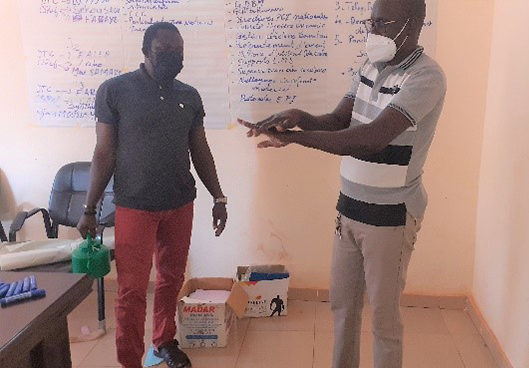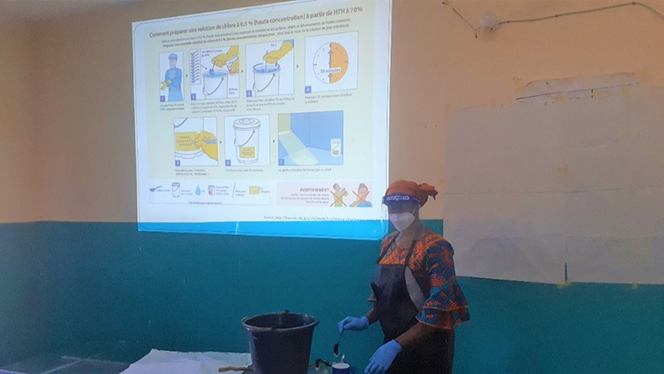MTaPS Helps Mali Increase Health Workers’ Knowledge on Ebola Prevention and Control
MTaPS Helps Mali Increase Health Workers’ Knowledge on Ebola Prevention and Control
Read this story on the MTaPS website
In February 2021, Guinea announced a confirmed case of Ebola in N’Zérékoré Prefecture. Following the confirmation of this case, the US Agency for International Development (USAID) Medicines, Technologies, and Pharmaceutical Services (MTaPS) program was tasked by USAID to build the capacity of health workers in Mali on infection prevention and control (IPC) to respond to a potential Ebola outbreak.

MTaPS provided technical and financial support to the General Directorate for Health and Public Hygiene and the regional directorates of health of Kayes, Koulikoro, and Sikasso to organize the assessment of IPC-Ebola interventions in reference health centers (CSRef) and train CSRef health staff and community health center (CSCom) technical directors on the prevention and control of Ebola in seven health districts.
The activities were conducted between June 21 and July 9, 2021, and the first objective was to assess CSRef management capacities of the Ebola outbreak using the World Health Organization scorecard tool, which was designed to evaluate the capacity of health facilities to manage infectious diseases. The second objective was to train CSRef health workers and CSCom technical directors in areas adjacent to Guinea on Ebola prevention and control by providing IPC information specific to Ebola, health care waste management, swab and transportation of biological samples, and respectful and secure burial of people who died of Ebola.
The assessment of the CSRefs revealed the intermediary capacity to manage an Ebola outbreak, with notable gaps related to waste elimination, hand washing, availability of patient triage infrastructure, equipment protecting staff against virus contamination, and training for staff.

MTaPS helped develop an action plan to address the identified gaps, requiring CSRef staff to perform a self-assessment with the scorecard tool two to three times per week to improve their score. The program also scheduled a follow-up supervision session in September 2021 to review CSRef progress.
Additionally, 103 people, including 28 women, from the 7 CSRefs and 32 CSComs were trained on Ebola prevention and control measures. Participants included doctors, pharmacists, hygienists, medical assistants, midwives, nurses, and administrators and were given a toolkit with the IPC training modules; visual aids; and videos on topics such as hand hygiene, donning and doffing personal protective equipment, and waste management.
The participating health workers found the training to be helpful in enabling them to respond rapidly to health crisis situations while protecting themselves and others in their communities.
Dr. Diakalya Dissa, from a CSCom in the health district of Sagabari (Kayes), indicated that “this training was very important [because] IPC is the bedrock for quality care. Applied correctly in the health and community sectors, IPC can help break the chains of contamination for infections such as Ebola, and its correct use protects health providers, their families, […] patients, and people who accompany them, as well as visitors, against contamination.”